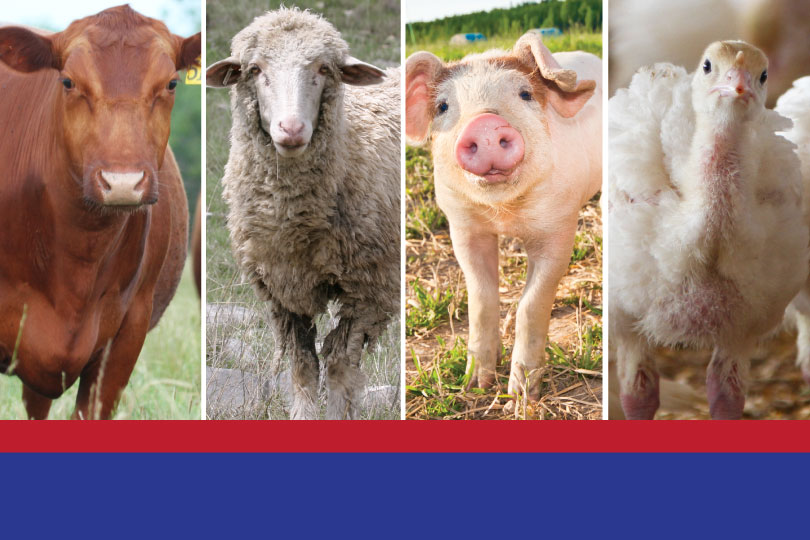By Julie Tomascik
Associate Editor
Each year brings new changes and new regulations. Next year will be no different.
Starting Jan. 1, 2017, one thing will be consistent for all farms and ranches—the Veterinary Feed Directive (VFD).
The regulations can seem intimidating, but the VFD is only directed at medically important antibiotics.
Under the VFD, over-the-counter sales of medically important antimicrobial drugs intended for use in feed or water will end. Farmers and ranchers will be required to get prescriptions for the use of feed-grade and water-soluble antibiotics. To get a prescription or feed directive, livestock and poultry owners must first establish a veterinarian-client-patient-relationship (VCPR).
A valid VCPR will allow the veterinarian to assist farmers and ranchers in all animal health decisions, especially if antibiotics are required. It includes a thorough knowledge of the farm, species of livestock, management practices and goals—a working knowledge of the farm or ranch.
When livestock or poultry get sick and are in need of medication, the VCPR will assist all parties in responding to their animal health needs.
“Antibiotics are not going away. Farmers and ranchers will have access to the same products, but their veterinarian will need to be involved to help make the appropriate decision,” said Tracy Tomascik, Texas Farm Bureau associate director of Commodity and Regulatory Activities.
After a VFD is written, a copy of the VFD document must be presented to the feed distributor—feed store, feed mill, etc. A copy will be kept on file, and the farmer will be required to maintain the third copy for two years.
The goal, according to Tomascik, is to ultimately reduce the need for antibiotics, and a cooperative effort between veterinarians and farmers can help make that a reality in many cases.
“Good nutrition and sound management practices will be further emphasized with a good veterinarian-client-patient relationship,” Tomascik said.
Antibiotic resistance in human health is real. The Food and Drug Administration in cooperation with the U.S. Department of Agriculture and the Centers for Disease Control have worked together to take these precautionary steps to curve back resistance development.
Judicious use is just as important in agriculture as it is in human health. Working together, farmers, ranchers, veterinarians and consumers can all feel confident that both animal health and human health will keep in good standing, Tomascik said.


In two years you will see no change in antibiotic resistance problems. You will see higher food cost. Producers don’t like this, veterinarians don’t like this. Only Washington lobbyist like this.
As always a government who knows nothing about what we do causes problems for everybody but the government. They always exempt themselves anyway.
Government is NOT your friend!
Another example of the government driving up production costs. Will off-shore countries importing animal and poultry products be required to meet the same requirements? Will US exports be competitive with countries not required to meet this requirement? Is the government aware of the full ramifications of this requirement?
Bill
Any food products shipped into the U.S. food system will still be tested for antibiotic residue like has always been done.
Competitively exporting of our meat and poultry products will have many factors. The U.S. dollar value versus foreign currency, U.S. meat prices and foreign demand will play large roles in trade. Retail meat and poultry prices are trending down, especially for beef so in the long term many folks believe exports will stay strong. Few countries can produce U.S. quality meat and poultry and so to compare U.S. beef exports and production costs to Australia, Brazil or Uruguay would be misleading.
Canada produces a similar beef product and they’ve phased out growth promotion use of antibiotics too. They also have a national animal ID program that gets them into export doors that have remained shut to the U.S.
Tracy
I agree Eric. All this will do is make it very difficult for the small producer to make a living. It’s redicous to think that a producer doesn’t have enough sense to judiciously use antibiotics in his management practices. By the time the vet is contacted and the drug is ordered, there will be so much mortality of livestock that the small producer will have to suffer great loses and ultimately go out of business. The government needs to stop taking away the needs of survival for the small producers.
I agree Eric! The only thing this will do is hurt the small producer. Vet bills and losses will be his future. Why do the governing powers have to take away the tools that are needed for a small producer to make a living? These producers do have the knowledge and the sense to use antibiotics judiciously! They are not using antibiotics unnecessarily. Ridiculous !!! Leave us alone.